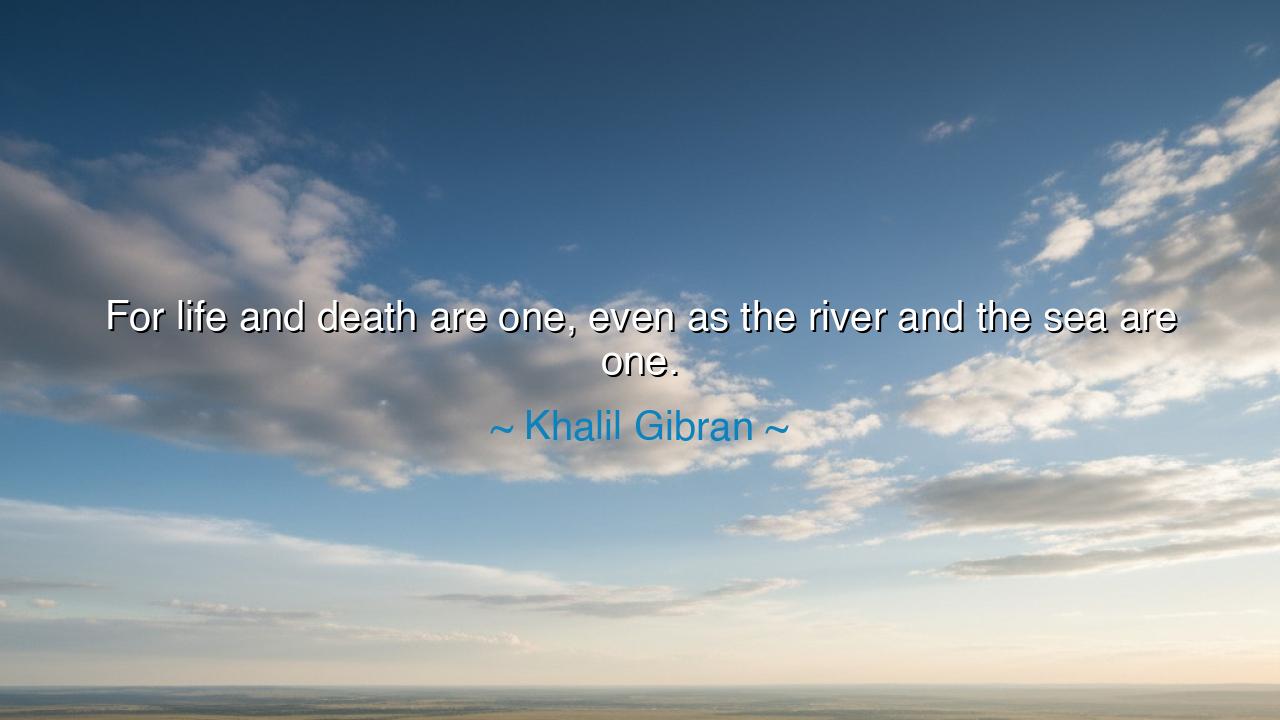
For life and death are one, even as the river and the sea are






“For life and death are one, even as the river and the sea are one.” — so wrote Khalil Gibran, the mystic poet of Lebanon, whose words have become rivers of light flowing across generations. In this single line, drawn from his immortal work The Prophet, Gibran unveils a truth that transcends religion, philosophy, and the frail boundaries of human fear. He tells us that life and death are not enemies, but two faces of the same eternal presence — that they are not opposites, but continuations, flowing one into the other as the river finds its rest in the sea. In his vision, there is no final separation, no dark abyss beyond the last breath — only the unbroken current of existence, changing form but never ceasing to flow.
The origin of this quote lies in the chapter “On Death” in The Prophet, a book that is less a collection of teachings and more a sacred conversation between the soul and eternity. Gibran wrote it in 1923, after years of exile, loss, and contemplation. Having witnessed both the beauty and the pain of human life — the fall of empires, the sorrow of migration, the passing of those he loved — he came to see death not as an end but as a return. Just as the river begins in the mountains, journeys through the valleys, and finally merges with the sea, so does the soul travel through the landscapes of time before uniting once more with the Infinite. In these words, Gibran comforts the living and redeems the dying, teaching that what we call death is but the continuation of life in another form.
To the fearful, death appears as a thief, robbing us of joy and identity. But Gibran whispers that death is the river’s homecoming, not its destruction. The river does not weep when it reaches the sea, though it surrenders its name and loses its boundaries. It rejoices, for it has found its purpose. So, too, the soul must one day dissolve into the great ocean of being, where individuality melts into eternity, and all separation ends. To understand this is to live without dread — to see that every sunset is but a dawn in another sky, every ending a doorway into vastness.
Consider the life of Socrates, the philosopher who, upon being condemned to death, drank the cup of hemlock with serenity. His disciples wept, but he smiled, saying that death was merely a passage to a greater wisdom. Like Gibran’s river, Socrates understood that his spirit would not cease, only change its course. He said, “To fear death, my friends, is to think oneself wise when one is not.” And so he walked calmly into eternity, unafraid of the sea that awaited him. His life became a living parable of Gibran’s truth: that death is not to be feared, but embraced as part of the same sacred journey that began at birth.
This teaching, ancient and eternal, calls us to reverence. It teaches that to live fully, one must live with awareness of death — not as doom, but as destiny. When we remember that life and death are one, we live differently. We hold each moment as precious, not because it will end, but because it belongs to the eternal flow. We treat others with gentleness, knowing that their time, like ours, is fleeting and sacred. We let go of bitterness, pride, and trivial pursuit, and instead seek what endures: love, compassion, wisdom, and truth. For these are the waters that will flow beyond the body, into the boundless sea.
Gibran’s metaphor also teaches acceptance. The river cannot resist the pull of the sea; if it tries to hold back, it stagnates and dies. So it is with the soul that fears change, that clings to the familiar and rejects transformation. Every ending in life — a loss, a farewell, a letting go — is a small rehearsal for the great return. If we meet these moments with grace, we learn to surrender not with despair, but with trust. We begin to see that death is not the opposite of life, but the completion of its circle, the embrace of the greater whole.
Therefore, my listener, take this teaching into your heart: Live not as one fleeing from death, but as one flowing toward eternity. Be as the river — vibrant, purposeful, yet willing to release itself when the sea calls. When sorrow comes, know it is but a bend in the stream. When joy rises, let it carry you forward. Do not cling to the shore of fear, nor fight the current of time. Instead, remember that you are part of something vast and holy, and that nothing in you will ever truly perish.
For Khalil Gibran, the river and the sea are not metaphors of loss, but of reunion. The river’s journey is the story of the soul — restless, beautiful, and destined to return to its source. And when it does, it does not vanish. It becomes one with the infinite — still flowing, still alive, but forever changed. So let us live with peace in our hearts, knowing that life and death are one, and that the sea of eternity awaits us all with open arms.






AAdministratorAdministrator
Welcome, honored guests. Please leave a comment, we will respond soon